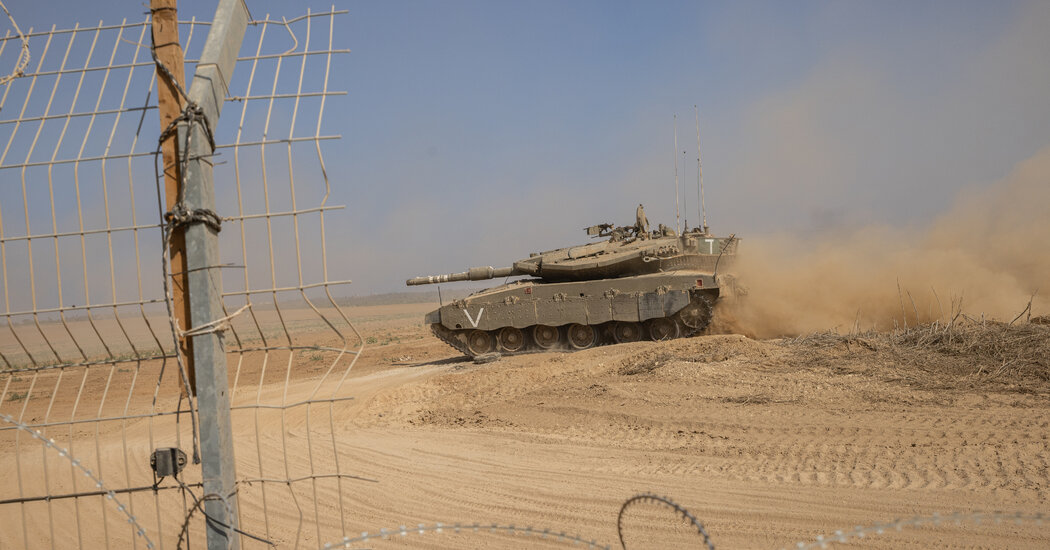However, in Gaza, it is less likely that the Authority will agree. “I doubt very much, after the experience of the West Bank, that there will be anyone willing to repeat that experience on the Palestinian or Arab side,” he said.
Zakaria al-Qaq, a Palestinian analyst, suggested that what Israel was discussing represented occupation, whatever it’s called.
“Either you are permanently there or you will not be there,” he said of Israel’s future role in controlling Gaza. “Either you stay or you don’t stay. Overall security control means being everywhere, in every corner. It means taking on social, educational and health needs and assuming responsibility” for the enclave, which is precisely what Israel says it will not do.
Despite Israel’s unilateral withdrawal from Gaza in 2005, by most legal definitions, it still occupies the territory, since it controls Gaza’s airspace, its coastline, all the land borders except with Egypt, the vast majority of goods allowed to enter and the Gazans allowed to leave. Lawyers call this “functional occupation,” said Michael Sfard, a lawyer who specializes in the laws of war.
Even before the Hamas attack on Oct. 7, Israel held “all the layers of control,” including the population register for births and deaths in Gaza, Mr. Sfard said. “The test for occupation is the level of control,” which is why Israel is judged internationally as continuing to occupy the strip, even if it is not responsible for collecting the garbage, he said.
And if Israel does chose to treat Gaza even like Area A in the West Bank, where it is free to enter and leave with its troops as it sees fit, that would mean an even clearer reason to call it an occupation, Mr. Sfard said.
Hola soy una periodista con experiencia y he traducido el contenido a continuación con las etiquetas de HTML:
Sin embargo, en Gaza, es menos probable que la Autoridad esté de acuerdo. “Dudo mucho, después de la experiencia en Cisjordania, que haya alguien dispuesto a repetir esa experiencia en el lado palestino o árabe”, dijo.
Zakaria al-Qaq, un analista palestino, sugirió que lo que Israel estaba discutiendo representaba una ocupación, sea como sea que se le llame.
“O estás permanentemente allí o no estarás allí”, dijo sobre el papel futuro de Israel en el control de Gaza. “O te quedas o no te quedas. El control total de seguridad significa estar en todas partes, en cada rincón. Significa asumir las necesidades sociales, educativas y de salud y asumir la responsabilidad” por el enclave, que es precisamente lo que Israel dice que no hará.
A pesar de la retirada unilateral de Israel de Gaza en 2005, según la mayoría de las definiciones legales, sigue ocupando el territorio, ya que controla el espacio aéreo de Gaza, su costa, todas las fronteras terrestres excepto con Egipto, la gran mayoría de los bienes permitidos para ingresar y los gazatíes permitidos para salir. Los abogados llaman a esto “ocupación funcional”, dijo Michael Sfard, abogado especializado en leyes de guerra.
Incluso antes del ataque de Hamás el 7 de octubre, Israel tenía “todos los niveles de control”, incluido el registro de la población para nacimientos y defunciones en Gaza, dijo el Sr. Sfard. “La prueba para la ocupación es el nivel de control”, por lo que Israel es juzgado internacionalmente como continuando ocupando el territorio, incluso si no es responsable de recoger la basura, dijo.
Y si Israel elige tratar a Gaza incluso como el Área A en Cisjordania, donde puede entrar y salir con sus tropas según lo considere conveniente, eso significaría una razón aún más clara para llamarlo ocupación, dijo el Sr. Sfard.
